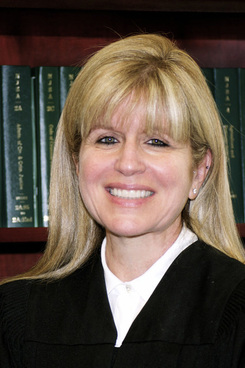An appeals court will consider a challenge to New Jersey’s system of mandatory pro bono service after a trial judge rejected claims that assigning lawyers randomly is a disservice to low-income litigants.
Counsel for attorney Michael Haya plans to appeal after claiming that his client lacks courtroom experience and is unqualified to represent a client accused of violating a domestic violence restraining order.
The New Jersey State Bar Association supports Haya’s challenge to the mandatory pro bono assignments, which dates to the state Supreme Court’s 1992 ruling in Madden v. Delran.
 Assignment Judge Deborah Silverman Katz of Camden County Superior Court. Courtesy photo
Assignment Judge Deborah Silverman Katz of Camden County Superior Court. Courtesy photo
Assignment Judge Deborah Silverman Katz rejected Haya’s claims that accepting the restraining order case would put him at risk of violating the Rules of Professional Conduct because of his lack of qualification.
But Silverman Katz relieved Haya from the pro bono assignment on March 10 after his would-be client, Jason Burgos, told a judge that representation by Haya would constitute ineffective assistance of counsel.
Although Haya no longer has to represent Burgos, he still could receive other pro bono assignments for which he is unqualified, said Edward Zohn of Zohn & Zohn in Warren, who represented Haya in the challenge.
“She was trying to have it both ways. The whole point of our argument is that it is ineffective assistance of counsel because most of the people aren’t qualified who are appointed. That is the point. It’s not that attorneys don’t volunteer, it’s not that attorneys don’t do pro bono work, it’s not that attorneys aren’t interested in indigent defendants,” Zohn said.
Haya is an attorney but has a full-time, nonlegal job in publishing. He says he would have to take vacation time from work to represent Burgos. Haya occasionally undertakes part-time legal work on weekends, advising clients on retirement plans, Zohn said.
Silverman Katz rejected Zohn’s claims that Burgos would be harmed by having Haya as an attorney. She said that the Supreme Court acknowledged in Madden that some lawyers would get assignments for which they have no direct experience. Silverman Katz noted that the Madden ruling addressed that situation, saying that “Even though attorneys may lack experience, the Supreme Court found that those attorneys were required not only to learn how to defend those cases but to find out where the courthouse is.”
 Edward Zohn of Zohn & Zohn. Credit: Amanda Brown/New Jersey State Bar Association
Edward Zohn of Zohn & Zohn. Credit: Amanda Brown/New Jersey State Bar Association
Silverman Katz’s decision said that Haya could obtain printed materials from the judiciary to help him with a mandatory pro bono assignment in an area where he lacks experience.
“Mr. Haya is registered by the state as an active, practicing lawyer. He has demonstrated the ability to become a member of the bar by graduating law school and passing the bar exam. He has certified that he renders advice as it generally relates to retirement plans and associated matters. He is certainly capable of reading and understanding the primers provided by the court in undertaking representation of Mr. Burgos,” Silverman Katz said.
In Madden, the Supreme Court said a municipality was not obligated to pay for legal representation of an indigent party facing a drunken driving charge in municipal court. Instead, the court created a system of assigning lawyers to unpaid representation of indigents by rotation.
 New Jersey State Bar Association President Lawrence Jeralyn. Courtesy photo
New Jersey State Bar Association President Lawrence Jeralyn. Courtesy photo
Zohn said the frequency of such assignments varies, with lawyers working in counties where a state prison is located getting more frequent assignments. Judges and attorneys working for government entities are exempt, he said.
A spokesman for the judiciary, Pete McAleer, declined to comment on the suit.
The New Jersey State Bar Association, which filed an amicus brief in Haya’s case, has long been a critic of the Madden system of giving out pro bono assignments.
NJSBA President Jeralyn Lawrence, who represented the bar association in the Haya case, argued that simply assigning an attorney does not satisfy a criminal defendant’s right to counsel. The association is expected to continue its involvement in the case on appeal.
“The mere appointment of counsel is not the standard in providing effective counsel and certainly can be characterized as ‘a sham and nothing more than a formal compliance with the Constitution’s requirement that an accused be given the assistance of counsel,’” Lawrence said in her brief, citing Avery v. Alabama, a 1940 U.S. Supreme Court ruling.
Zohn also is critical of the system the court has created to comply with Madden.
“Effectively what happens is attorneys are called from this list and the judiciary pats themselves on the back because they are assigned without understanding the attorney they’ve assigned is not fulfilling a requirement to be competent at what they do,” Zohn said. “This is the responsibility of the judiciary and the Legislature to create a system that’s fair to everybody, especially the defendant.”
NOT FOR REPRINT
© 2024 ALM Global, LLC, All Rights Reserved. Request academic re-use from www.copyright.com. All other uses, submit a request to [email protected]. For more information visit Asset & Logo Licensing.


 Credit: Adobe Stock
Credit: Adobe Stock





